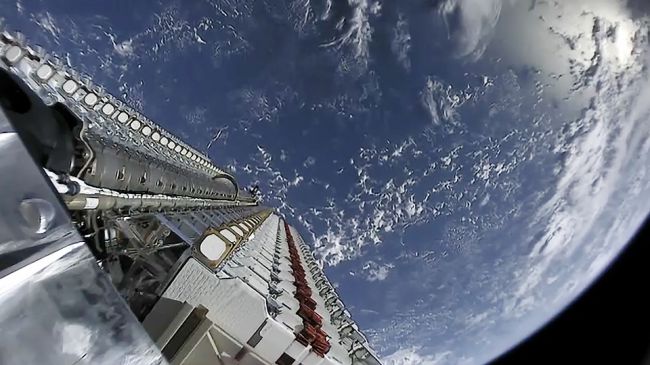

A stack of flat Starlink satellites prepares to deploy in Earth orbit. Image credit: SpaceX
SpaceX thinks of its network of Starlink broadband satellites as akin to a cluster of servers in a data centre receiving frequent software updates for issues such as performance and security, the company has said.
Speaking with Reddit users at a question-and-answer session, the company’s director of Starlink software Matt Monson said the constellation requires “a ton of software to make it work”.
That software is updated about once a week, on top of constant deployments of test software, while ground systems are updated twice or more per week, Monson said.
“Small improvements in the software can have a huge impact on the quality of service we provide and the number of people we can serve,” he said.
“On this kind of project, pace of innovation is everything.”
SpaceX launched another 60 Starlink satellites into low Earth orbit last week, bringing the total to around 480 out of the 800 needed to provide a basic level of service.
The company recently applied to US regulators to launch 30,000 second-generation satellites, on top of the 12,000 first-generation models initially approved for launch.
Monson said the devices function in a way similar to Linux-based servers.
“For Starlink, we need to think of our satellites more like servers in a data centre than special one-of-a-kind vehicles,” he said.
“This is a hugely powerful change in how we think about space vehicles, and is absolutely critical to being able to iterate quickly on our system.”
Each launch of 60 satellites contains more than 4,000 Linux systems, with the constellation currently running more than 30,000 Linux nodes and more than 6,000 microcontrollers.
Much of the Linux platform infrastructure is shared between Starlink and the Falcon rockets and Dragon capsules, he said.
For instance, the technology from the displays used in the Crew Dragon manned capsule formed the basis of the user interface for the first couple of Starlink satellites.
“It’s grown a ton since then, but it was awesome to see Bob and Doug using something that somehow felt familiar to us too,” Monson said.
He said the satellites are currently generating more than 5 TB of data per day, with SpaceX working on reducing the amount of data each device sends as it scales up the number of satellites in the system.
“As far as analysis goes, doing the detection of problems onboard is one of the best ways to reduce how much telemetry we need to send and store (only send it when it’s interesting),” Monson said.
He added that the alerting system SpaceX uses is another component shared between Starlink and Dragon.
Security is a growing issue for the constellation, with Monson saying the system uses end-to-end encryption and is designed to only run software signed by SpaceX itself, so that “even if an attacker breaks in, they won’t be able to gain a permanent foothold”.
The constellation and ground-based data centres are hardened to keep vulnerabilities from giving an attacker broad access across systems, Monson said.
And in the event that a satellite loses communication with the ground, it is programmed to go into a high-drag state that allows the atmospheric drag to pull it down.
In order to make sure that such issues don’t affect end users, the network is designed to have multiple satellites in view that can serve any single user.
“Launching more satellites is our core competency, so we generally use that kind of fault tolerance wherever we can, and it allows us to provide even better service most of the time when there aren’t problems,” Monson said.
Italy, White House issue joint statement condemning 'discriminatory' tech taxes as US seeks to end…
Italian newspaper Il Foglio says four-page AI-generated supplement published every day for a month shows…
Huawei launches Titanium edition of Eyewear 2 smart glasses with gesture controls and AI-powered simultaneous…
Gerald Yin, founder, chairman and chief executive of key Chinese chip tools maker AMEC, drops…
Intel reportedly tells clients in China some of its AI chips will now require export…
New Intel chief executive Lip-Bu Tan flattens company's leadership structure as he seeks to end…